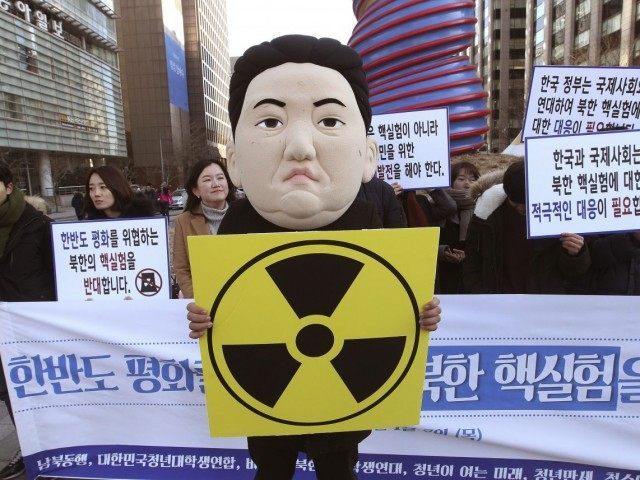North Korea’s rogue regime recently conducted its fourth and most powerful underground nuclear test, with independent sensors detecting a 5.1 magnitude seismic event.
The United Nations Security Council unanimously called the test a violation of previous resolutions and a “clear threat to international peace and security.”
In a fit of braggadocio, the regime immediately claimed the nuclear test was a hydrogen bomb with a miniature warhead, the type that could be placed on a missile and threaten, among others, South Korea, Japan and the United States. It also said the test was a repudiation of U.S. President Barack Obama’s ‘strategic patience policy’ which it says seeks to minimize communications between the two countries and increase sanctions until North Korea gives up its nuclear weaponry. Independent security experts labeled it a dangerous development, but did not believe it was a hydrogen bomb.
North Korea presents the U.S. with one of its most difficult foreign policy challenges. Among other things, it started the 1950-1953 Korean War and now regularly provokes South Korea, Japan and the United States; abuses citizens with gulag prison camps and does not allow them to freely elect their leaders; ignores U.N. Security Council resolutions and reneges on international agreements with impunity; and reportedly has illegally shipped weapons of mass destruction technology to dangerous places like Iran, Libya, Pakistan, Syria and Yemen. Moreover, established democracy and human rights watchdogs consider it among the world’s worst dictatorships.
Since North Korea gained statehood in 1948 – courtesy of the Soviet Union’s Joseph Stalin – this Korean Peninsula nation of nearly 25 million people has been ruled exclusively by the Kim Dynasty (Kim Il Sung; his son Kim Jong-il and his grandson Kim Jong-un) under a totalitarian Stalinist military-style government. This isolated, impoverished and belligerent country maintains one of the world’s largest armies but depends on foreign aid for food and fuel. It has a strong relationship with Russia, while China serves as its chief benefactor and protector.
The Clinton, Bush and Obama administrations have used diplomacy and $2 billion in food and fuel enticements as the prime means to harness North Korea’s nuclear ambitions. However, North Korea broke every major promise in President Clinton’s 1994 bilateral Agreed Framework, President Bush’s 2003 multilateral Six-Party Talks, and President Obama’s 2012 bilateral Leap Day Agreement. It also violated every U.N. Security Council resolution (including UNSC 1695, 1718, 1874 and 2087) aimed at stopping the regime’s nuclear weapons development program.
Campaigning for U.S. President in 2008, Obama promised “to pursue the kind of direct and aggressive diplomacy with North Korea that can yield results,” with the goal being the “complete and verifiable elimination” of North Korea’s nuclear weapons program. That diplomatic strategy spectacularly failed. During the Obama presidency, North Korea exploded nuclear devices in 2009, 2013, and 2016. And the rogue state has developed an array of different missile systems, with its Taepo Dong 2 missile capable of reaching most of the continental United States.
President Obama is now confronted with the profound question on North Korea of “where do we go from here?” Some suggestions follow:
- Don’t pursue failed policies, especially bilateral U.S./North Korea negotiations, with North Koreans and expect different results. Moreover, South Korea and Japan should always be a part of, or lead, any negotiation that directly impacts their national security.
- Don’t expect the U.N. Security Council to pass tougher resolutions with North Korean protectors China and Russia wielding veto pens, especially since they are gradually slipping back to their old totalitarian ways with hardline leaders and Cold War-era mindsets.
- Rethink and redo U.S. treaties and agreements with South Korea and Japan, which make those countries, to varying degrees, too dependent on the U.S. for protection. Those free, prosperous and technically advanced nations are quite capable of defending themselves from threats emanating from North Korea, China and elsewhere with far-less U.S. support.
- Continue supporting the efforts of Japan’s Prime Minister Shinzo Abe to amend Article 9 of the country’s pacifist constitution, which currently requires Japan to renounce war as a sovereign right and allows the U.S. to maintain an in-country military presence to protect it.
- Work with South Korea to expand broadcasting and other information operations to inform the North Korean people about their own country and the outside world. An informed public may serve as the catalyst to change their repressive government.
- Urge the U.S. Congress to pass a resolution for presidential signature condemning North Korea’s nuclear weapons program and proliferation activities and also saying that the U.S. formally supports North and South Korea reunification as a free country. While symbolic, it would send a clear message to friends and foes that the U.S. considers North Korean regime change as the penultimate solution to the problem.
- Inform China’s leaders during diplomatic consultations that continuing support of North Korea and toleration of its nuclear weapons development program could adversely affect its most favored nation trading status. This status has allowed some 300-plus American manufacturing businesses to operate in China today. It has also helped China transition from an impoverished nation to the world’s largest economy at some $18 trillion annually and the world’s leading exporter of manufactured items.
The United States, along with the United Nations and some of its member states like China and Russia, condemned North Korea’s latest nuclear test and promised more action against the rogue state. However, words and continuing failed strategies and policies are once again unlikely to dissuade the North Koreans from continuing to develop its nuclear weapons program. Progress on this issue requires a new policy direction accompanied with innovative ideas and strong leadership, especially from the United States.
Fred Gedrich is a foreign policy and national security analyst. He served in the U.S. departments of State and Defense.

COMMENTS
Please let us know if you're having issues with commenting.